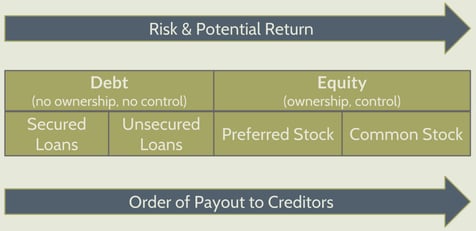Debt vs. Equity in Business

When raising money as a business, whether old or new, it is important to carefully consider the best way to fundraise--i.e. whether it will take the form of debt or equity. In short, "debt" refers to loans, while "equity" refers to giving away a piece of ownership in the business. When deciding on debt vs. equity, or a combination of the two, entrepreneurs should take into account the advantages and disadvantages of each approach.
Debt vs. Equity: Control of the Enterprise
When an enterprise issues equity, it gives away a "piece of the pie" (either stock in a corporation or membership rights in a limited liability company). By contrast, when a company issues debt, it does not give away any ownership in the company.
Entrepreneurs should consider whether it is a good strategy to give away ownership in the company prior to doing so. Ownership can come with certain rights, such as voting rights on most company decisions, information rights to inspect the company's finances, and others. Even though these rights can be modified in an LLC through an operating agreement, an investor is unlikely to take equity in exchange for putting her money into a company in which she has no control. By contrast, the rights of shareholders in a corporation are provided by statute and cannot be modified, even in the corporation's organizing document and bylaws.
For this reason, founders of a business should carefully consider whether to give equity to a friend or family member who is willing to invest at an early stage of the company's life. The decision to give away equity--and how much equity--depends on a number of factors including whether the friend or family member is a good fit for the team, the extent of her involvement in the company, the value she provides to the company, and others.
While equity transactions can at times be structured to avoid many of the implications of giving away ownership, one big advantage of raising money through debt is that no ownership--and no control--is given away.
Debt vs. Equity: Obligations to Funders & Risk/Reward
The biggest, and most obvious, downside of raising money through debt is the obligation to pay back the loan provided to the company. And if the company does not have money to pay back the loan, the holder of the note can force the company into bankruptcy. In this way, the risk to the funder is lower. Additionally, many lender will require new businesses without a significant credit history to have a personal guarantee on the loan (meaning that personal assets are available to satisfy the debt). However, the potential reward to the funder is also lower because the funder is only repaid the principal amount of the loan plus an agreed-upon interest, regardless of how successful the business becomes.

By contrast, holders of equity take the equity at a higher risk, but also with a higher potential reward. Equity holders cannot force a company into bankruptcy because there is no guaranteed payback for their investment, making it a high-risk investment. However, the potential reward is also higher because when the value of the company increases, so does the value of the piece of the pie owned by the equity holder.
In the event that a business decides, or is forced, to shut its doors, debt holders generally get paid out before equity holders.
When to Use Debt
Based on the considerations listed above, debt is a good tool for businesses that have a definitive plan for paying back the loan. For example, a business that already has a solid revenue model that it has executed but needs capital for equipment or other operations to scale the business frequently use debt to accomplish their goals.
While debt can also be used early on to get a business going, it should be sparingly used by startups who plan to attract equity investors over time because debt on the books of a startup is not attractive to investors. Investors want their money to be used to increase the value of the business, not to pay back loans.
When to Use Equity
 Equity is the currency of early stage companies. The potential for high return through obtaining a piece of the pie is a great incentive for early stage funders (and employees and contractors). Thus, issuing equity in exchange for funds or labor is a great tool for startups to get the wheels turning and get the business in motion. However, founders should carefully consider the amount of equity that is proper in a given transaction.
Equity is the currency of early stage companies. The potential for high return through obtaining a piece of the pie is a great incentive for early stage funders (and employees and contractors). Thus, issuing equity in exchange for funds or labor is a great tool for startups to get the wheels turning and get the business in motion. However, founders should carefully consider the amount of equity that is proper in a given transaction.
Based on this discussion, it is clear that both debt and equity have significant downsides. Thus, founder should seek to follow the lean startup model when possible and bootstrap until it makes sense to raise funds through debt or equity.
A Note About Securities Laws
Both debt and equity are considered "securities" under applicable state and federal laws, so entrepreneurs should consider securities exemptions when issuing either debt or equity. See this article on common federal exemptions, and this article on common California exemptions.
DISCLAIMER: The information in this article is provided for informational purposes only and should not be construed or relied upon as legal advice. This article may constitute attorney advertising under applicable state laws.
Categories
Recent Posts
- Startup & VC Attorney Paige Southworth Joins SPZ Legal
- Startup Funding: Selling Shares to Raise Funds
- Program-Related Investments (PRIs) for Startups
- Sam Taylor & Becky Mancero Best Lawyers: Ones to Watch®
- Boulder Landscaping Acquired By Strata Landscape Services
- The Delaware Flip: What Startups Should Know
- SPZ Legal Advises Redfast on Strategic Acquisition
- Raising Startup Funds from Friends and Family